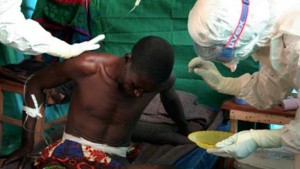 In 2 years time the Ebola virus will celebrate the 40th year of its discovery. It really is a twin birthday because it was 1st reported in 1976 in humans in both Zaire (now the Democratic Republic of the Congo) and Sudan writes Dr. Charlie Easmon, Medical Director at ALC Health and Your Excellent Health
In 2 years time the Ebola virus will celebrate the 40th year of its discovery. It really is a twin birthday because it was 1st reported in 1976 in humans in both Zaire (now the Democratic Republic of the Congo) and Sudan writes Dr. Charlie Easmon, Medical Director at ALC Health and Your Excellent Health
I am privileged to know two of the original investigators/discovers of the virus who both work at the London School of Hygiene and Tropical Medicine, Professor Peter Piot and Dr David Heymann.
We know now that this virus has 5 subtypes, 4 of which can cause severe illness in man. The 5th affects monkeys and can infect man but does not cause any significant illness.
How long this virus has been on the earth is unknown but we do know that it has animal reservoirs such as bats. How it first gets into a human is not definitely known but it probably starts with eating infected animals (so called ‘bushmeat’)
Interestingly the virus is known to survive several weeks in semen but we do not know if that is a definite mode of transmission.
We know that once a human is infected the mortality without treatment will be between 50-90% depending on the strain. We know that it spreads by contact with infected blood or mucus. To date we do not know if the virus can be air-borne but fortunately we think it is not.
The symptoms start as sudden but non-specific with headache, muscle pains malaise, diarrhoea and fever. These are quickly followed by a bleeding tendency which is often fatal. Bleeding occurs from every orifice or any inflicted wound or medical access point. The incubation period is 2-21 days, which means that if you are exposed and not ill after 21 days you are safe.
Health care workers are infected by contact with blood or mucus and hence the need for basic precautions such as gloves, masks, goggles and where available bio-suits.
Relatives get infected by caring for the living and direct exposure to blood or mucus or as in many traditional African practices washing and cleaning the dead body. In the 1st outbreak it is now clear that non-medically trained nuns spread the infection by using unsterilised needles on a few hundred patients. Controlling this virus in a country with good public health, trust in medical services, non-traditional practices and rule of law is relatively straightforward.
The spread within Africa is an indictment of lack of early political will, public health and lack of trust (understandably) in poorly functioning health systems.
With WHO and the African Development Bank offering millions to help control this infection let us hope that the money is used wisely.
What can you and your staff do to reduce the risk?
One option is not to go until the whole thing is declared over and recently borders have closed and airlines have stopped flying to affected countries.
However, business still needs to go on and you may have existing staff there.
Your staff should know the symptoms of Ebola, they should know who to send home when ill. They should know where to seek appropriate medical help.
A suspected contact case should be monitored for 21 days with daily temperatures.
If a local clinic does not have the basics such as gloves, masks, goggles and is suspected of reusing unsterilised medical equipment such as needles do not go there. You may need to supply your staff with their own kits including thermometers..
Local staff need to be educated about the disease and the public health measures required to control it. Traditional burial practices that involve washing or handling dead bodies need to cease.
Is there treatment for Ebola?
There is currently no vaccine and given the huge cost of vaccine development this may never happen. There are experimental drugs which use serum antibodies such as that used on the doctor flown to the USA.
The bleeding tendency and fluid loss need well-managed fluid regulation which is difficult and increase the risk to medical staff.
Conclusion
The spread of Ebola could have been stopped in the earlier stages for a few thousand of pounds but is now going to cost the UN agencies and African governments million in lost revenues and costs of control. As long as the virus does not become airborne with the correct draconian public health measures it will be controlled within the next few months and business will return to normal.
This infection reminds every company to review its disaster recovery/business continuity plans since Ebola is just one bio-threat. There are things out there that we do not yet know about. We still have the possibility of another pandemic flu, extremely drug-resistant Tuberculosis and Middle East Respiratory Virus to contend with. So all companies should be bio-vigilant!
Dr Charlie Easmon
MBBS MRCP MSC Public Health DTM&H
Medical Director, ALC Health
Medical Director, Your Excellent Health
